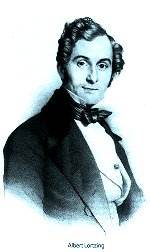
Albert Lortzing was born into a
German theatrical family and was himself
an actor as well as a composer, much
influenced by the style of Mozart and
Weber. Lortzing in turn influenced both
Wagner and Johann Strauss II. Today
he is still remembered for his operettas
which occasionally appear in the mainstream
repertoire. Zar und Zimmermann (1837),
Der Wildschütz (1842) and
Der Waffenschmied (1845) still
play in Germany, but Undine is
less well known.
Undine
is based on a short fairy tale by Motte-Fouqué.
It inhabits a magical world from which
the water nymph, Undine comes. The ethereal
realm of elemental spirits provides
the romantic imagination from which
the opera draws its strength. The libretto
tells how humans who become involved
with the spiritual world will come to
grief and tragedy. The interaction between
reality and fantasy is at the heart
of plots of German romantic opera up
to Wagner. The skilful Lortzing usually
wrote the lyrics for his operas himself,
but for Undine he turned to a
separate librettist, echoing Mozart
who said that ‘in an opera, the verse
absolutely has to be the obedient servant
of the music’. Lortzing was more
down to earth in his views: ‘Operatic
verse! What’s the point of going to
great lengths over it? The composer
has to throw (in) everything that makes
up the poetry ... on to a bonfire, so
that the phoenix that is the music can
rise from the ashes.’ Fouqué
had died two years before the production
reached the public and the subservient
librettist to Lortzing was E. T. A.
Hoffmann.
I find Lortzing’s treatment
of delicate imagery rather heavy and
this is partly due to the fact that
he asked Hoffmann to write a more tragic
treatment of the original story. In
it, a knight, Hugo, falls in love with
a fisherman’s foster-daughter, Undine,
and decides to return with her to his
city to marry her. This is the action
of Act 1. She declares that she does
not have a soul and has been sent by
the water sprite, Kühleborn, to
gain one from human involvement. Much
of the opera concerns Undine’s disclosure
of her origin to Hugo and interaction
with a rival, Bertalda. Undine is later
disowned and returns to the water kingdom.
At the castle festivities for Hugo’s
wedding to Bertalda comes revenge from
the water kingdom (who presumably gain
entry via the castle well). The clock
strikes midnight and the castle comes
crashing down. All but a repentant Hugo
are killed! Hugo is now allowed to join
the sprite’s watery kingdom with Undine
for the rest of his life.
The opera contains
some glorious music yet on an initial
hearing one is not aware of much thematic
development. Lortzing attempted to develop
his own style of singspiel in the same
way that the 19th century
British school tended to promote the
ballad.
Only one other version
is known to me, EMI’s 1967 Berlin recording
by Robert Heger. That has been a benchmark
for this work up to now. Surprisingly,
both recordings have merits, but Heger’s
pacing is sometimes pedantic in comparison
and his balance between sections of
the orchestra is not always good. This
puts the Capriccio recording in a positive
and energetic light: the sound is for
example sharper with the violins more
crisply defined. Of the singers, both
recordings have strong casts, all in
excellent voice and with clear diction.
However, at times I consider the flow
of arched phrases from Monika Krause
rather choppy and staccato when compared
with the breezy flow Anneliese Rothenberger,
forty years earlier. This is most evident
in tr.4 (CD1) of both sets. The chorus
are more fiery in the Capriccio recording
and are helped by the faster pace.
The booklet with very
brief notes is written in German, English
and French.
Raymond Walker

